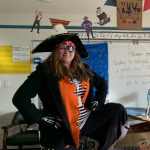Kelly Wallis, 3rd grade teacher at Havens Elementary
PEF: What was your path to becoming a teacher?
Wallis: I come from a family of teachers – grandmother, mom, aunts, uncles and cousins. It was a natural path for me – much to my mother’s dismay! She was a little heartbroken because she knew the struggles I would have, and the choices I would need to make for my own family if I became a teacher. But it was inevitable that I go into education. I was a swim coach for many years and graduated from UC Davis with a degree in Human Development and Education. I worked as a substitute teacher, then got my multiple subject credential at St Mary’s. I taught in Lafayette for many years and I started teaching in Piedmont in 2014 as a 5th grade at Havens. Later I taught technology, and now I teach 3rd grade.
PEF: What brought you to the PUSD?
Wallis: My husband grew up in Piedmont, and I had always heard about amazing programs and opportunities that were provided by Piedmont schools. He and his friends would talk about the experiences that they had in school when they were kids, and how students would overlap between sports and music or engineering. It was very different than the schools I grew up in. I was really impressed by the focus on the whole child in Piedmont.
PEF: What brings you the most joy about your work?
Wallis: I live for those little moments – where you see the wheels turning and then suddenly students understand something for the first time, or when they’re proud of themselves for something they’ve accomplished. I have a student this year that previously didn’t think she was good at math. I‘ve been working to slowly break down that wall, so she can start to see that she is good at it. Just this week, we were doing an activity around multiplication, and she was the first to see the pattern and figure out a tool to solve it. I was standing near her, and leaned over and said “You’re the only one in the class who thought to do that!” She was so excited to share her math strategy with the class – and in the week since, she’s been more engaged, more excited about math. I hope that excitement stays with her. Those are the moments that bring me the most joy.
PEF: What resources would you like more of for your students?
Wallis: More aide time! They are priceless. When I have an aide, and I can give them a small group of students that need more academic challenge or a group that needs more support, it’s priceless. Nothing can replace it. And aides don’t have subs – If someone gets sick, or has the cover for a teacher who is absent, we just don’t have an aide that day, so I may not be able to do everything I had planned with my students. Aides are so important. They make it possible to engage with more students every time they are in the room.
PEF: How do class sizes influence your work?
Wallis: This very much links to the idea of more aide time. In other districts, I’ve taught classes of up to 30 students – it makes small group instruction so much more challenging. I need to be able to pull small groups of kids based on their academic needs, and when I had 30 kids, it would take me a whole week to get to everyone in a small group. This year, I have a class of 23. It would be so hard to manage a class with more students, more needs. Every student over 20 adds so much complexity – it completely changes the dynamic.
PEF: How does technology impact your students?
Wallis: It impacts my students in so many ways. Recently, for an open-ended project, I had a student who chose to demonstrate her understanding of a story by using technology. She wanted to do a survey by hand, but because we have Chromebooks, I was able to show her how to make a Google form. In one hour, she created a survey with thoughtful questions, shared it with the whole class, got responses, analyzed the data, and later presented her findings to the class in the form of pie charts and percentages. This student is strong academically, but she can be shy. Now, all the other kids are seeing her put together a sophisticated presentation poster and they see her in a different light. She even taught another student how to do this process. Together they are feeling really proud of themselves, and the whole class is excited about what they’re doing. It’s all because of technology – because we have these resources, I was able to say, “Let’s go get a Chromebook and figure this out together!”
PEF: How do other educational specialists, like PE instructors and librarians, impact your work?
Wallis: I can’t say enough about the specialists, like our PE teachers, and how important they are in helping us understand our students. For example, our PE instructor, Kelly Caldwell, was able to pinpoint something in one of my students this year around hand-eye coordination that has helped me work with that student in a more complete way. Without his relationship and experiences with this student, we would not have the complete profile of what this student really needs.
And in terms of our librarians, I rely so much on them to help me find resources for my students. For example: I might ask for books on pirates, and Ms. Remer and her aide can pull 50 books, ebooks and online experiences, and have them ready for my students. When a student says, “I like this book, what should I read next?” the librarians can find them the perfect book – she keeps them engaged and hooked on reading in a way I can’t. There is no way I could keep up with current authors and digital text they way that she does.
PEF: What do art and music bring to your student’s educational experience?
Wallis: Having art and music is super important, especially for kids who have different learning styles. For example, there are some kids who won’t fully understand multiplication until they’ve done measures with our music teachers. Some of my students won’t understand negative space or symmetry until they’ve experienced it with our art teacher, Ms. Price. They are true professionals in their fields.
PEF: What do you find most challenging about being a teacher?
Wallis: The biggest challenge is the emotional toll of teaching, from absorbing all the needs that these little humans are bringing to my classroom. This is not a career where you can go home and leave it behind – It feels like they’re with you all the time. The emotional needs are huge. I am constantly thinking of ways that I might better engage my students, how I could approach conversations with students and their parents in different ways to meet their needs. The social emotional teaching that is happening in today’s classrooms is super important and changes every day.
PEF: What challenges do you see your fellow educators facing?
Wallis: A big piece has to do with the finances. There are a lot of demands on teachers, and it’s hard to know that if we moved out of the Bay Area, we could still do what we love and also meet the needs of our own family. A lot of us look back at our career paths – we have advanced degrees, and if we had chosen to do something else, our families would be in a different financial situation. I’ve had friends who have left teaching, and they get picked up in other professions quickly because the corporate world values the skills that teachers bring. Especially their work ethic. Who else can eat lunch, run copies, use the bathroom, answer emails and grade a stack of papers all in 30 minutes?
PEF: Anything else that our community should know about our schools?
Wallis: Before I taught in Piedmont, I knew how great the schools were, but I didn’t know how much of it relies on funding from parents. I didn’t realize how much of what happens in our schools relies on the community to make it happen. I feel a huge sense of responsibility to keep the tradition of what we have here in our schools in Piedmont alive and thriving.



